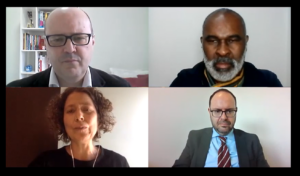The diversification of funding sources and the active participation of the State are fundamental elements to guarantee the economic viability of news outlets. This was the conclusion reached by the participants of the panel "Long life to independent journalism: But who will pay for it?," held during the 17th International Congress of the Brazilian Association of Investigative Journalism (Abraji, by its Portuguese acronym).
The debate was moderated by Agência Mural's director of operations, Izabela Moi. Also participating in the panel were Fabiano Angélico, researcher and Ph.D. student at the University of Lugano (Switzerland), Giovanni Harvey, executive director of Baobá Fund, and Guilherme Canela, global head of UNESCO's Freedom of Expression and Security section.
For Angélico, a business model based on the search for funding from private philanthropy institutes is not very efficient because it requires a long preparation time to obtain funds that, sometimes, offers little breathing room. The researcher advocates for the need for a paradigm shift in favor of diversification of fundraising sources.
"This is perhaps the best way to sustainability and financial independence. It is a business model that can sustain itself partly with supporters, partly with individuals, partly with crowdfunding, and with companies supporting in some way. I have seen some very interesting innovations. For example, a certain sector of industry can finance a study by a news outlet, which prepares a study using journalistic criteria. And this becomes transparent to the public," Angélico said.

Fabiano Angélico, Giovanni Harvey, Izabela Moi and Guilherme Canela. (Photo: screenshot)
In reference to UNESCO's Windhoek +30 Declaration, Guilherme Canela reinforced the importance of classifying journalism as a public good - the theme of World Press Freedom Day in 2021. In a context of disinformation, hate speech, and conspiracy theories, he stated that one of the great challenges is to qualify the demand with informational media literacy strategies - educommunication - to empower citizens.
"One of the important elements is to try to recover the credibility of journalism. For that, it's going to be fundamental to continue a dialogue with the general public about what it would mean to live in a world without independent journalism. And I don't think we've been able to get that message across yet," Canela said.
He added that investigative journalism is often exclusively identified with fighting corruption but that major investigations, such as Panama Papers and SwissLeaks, can be far away from people's everyday lives. "We need to emphasize that journalism impacts every stage of everyday life, whether it's journalistic investigations that have managed to unravel pedophile networks in the Catholic Church or investigations that have changed the transportation of human organs and saved lives."
Giovanni Harve — executive director of Baobá Fund, a fund that seeks to promote racial equality — pondered that strengthening a journalism environment does not necessarily require direct investment in news outlets. Harvey defends the creation of incentives through awards that value good initiatives, from contributions to specific episodes to exposing the use of the State body as a repressive apparatus. This was the case of the "gas chamber" in a vehicle of the Federal Highway Police (PRF, by its Portuguese acronym) in Sergipe, which killed Genivaldo de Jesus dos Santos, a Black man diagnosed with schizophrenia. He died asphyxiated after inhaling gas in the trunk of a police car after getting stopped by a highway patrol.
"The PRF's first position was to omit the identity of these agents. And it was the practice of journalism that brought this information to light, just as the access to the arrest records of these police officers involved," he said. "The idea is to create mechanisms that allow people who undertake this to get some level of support. Not in the sense of financing the action that gave rise to the recognition, but in the sense of having some kind of stimulus and inspiring other professionals to create this path."
During the panel, Fabiano Angélico, from the University of Lugano, argued that it is wrong to deny the State as one of the entities responsible for funding the media. "It is a dogma that needs to fall away. If journalism is a public good, fundamental to democracy, this is one more reason for us to have the conviction that it is important for the State to finance it, yes," he stressed.
Canela agreed that part of the taxes paid by taxpayers could be one of several sources of revenue for the media but warned about the importance of ensuring "adequate" financing of journalism. He said that the path forward is to achieve economic sustainability without losing the principles of editorially independent journalism.
"The big conclusion is that there are no simple solutions to complex problems. And this is a complex problem," he said. "It is increasingly clear that public goods like clean water, clean air, and a planet to live on cannot be financed by the private sector alone. There needs to be taxpayer money for these public, common goods to exist. So if journalism is a public good and information is a common good, they won't be able to be financed solely by the private sector."